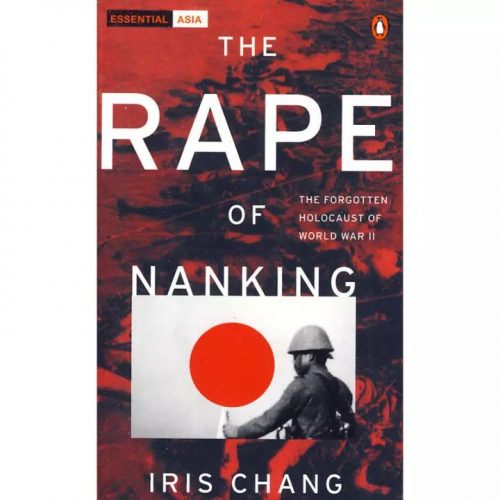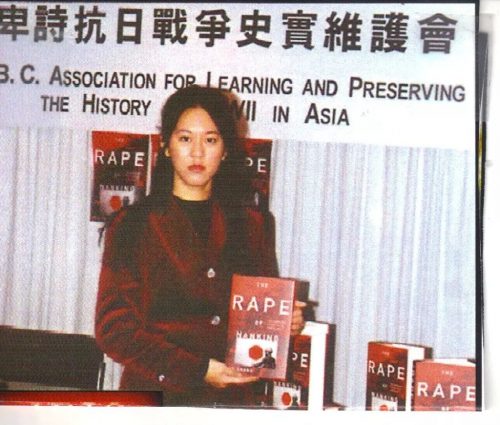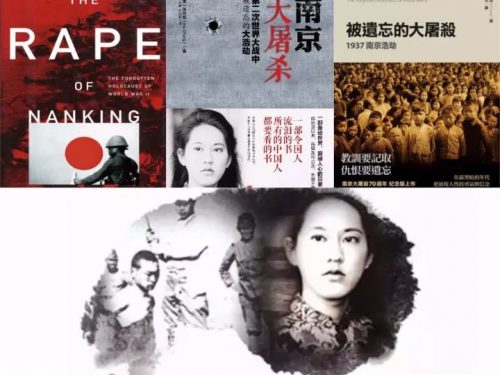80年前的今天,侵华日军攻陷南京,制造了震惊中外的南京大屠杀惨案。30万同胞惨遭杀戮,无数妇女遭到蹂躏残害。
然而,这些事实曾长期被忽视。犹太人大屠杀在西方称得上家喻户晓,但关于南京大屠杀,英文世界里却几乎没有任何书籍提及,普通人更是对此几乎一无所知。
直到一本书的出现。

1997年,时年29岁的华裔女记者张纯如(Iris Chang,1968 - 2004)发表了英文著作《南京大屠杀:被遗忘的二战浩劫》(The Rape of Naking,又译作“南京暴行”),震惊了世界。
在这本书中,大量的史料得到了首次曝光,许多的史实第一次用英文得到了描述。
正如哈佛历史系教授威廉·柯比在该书序言中所言:“南京的暴行在西方已几乎被人们遗忘,所以,本书的问世尤显重要。”

这本书发行后,长时间占据美国各大图书榜单,已再版十余次,被翻译成多种语言。
这本书,让西方世界的大多数人首次了解到了日军的暴行,让南京大屠杀成为了全世界的共同历史记忆。
今天,当我们重读这本书,再次读到了张纯如对这一惨案触目惊心的描写。
日军的暴行
在书中,张纯如对比了南京大屠杀与第二次世界大战中的其他几次大屠杀的死伤人数。
不过,她说我们不仅应当记住死亡人数,还不能忘记日军的残忍手段。张纯如这样描写日军的暴行:
The Rape of Nanking should be remembered not only for the number of people slaughtered but for the cruel manner in which many met their deaths.
我们不仅应当记住南京的暴行中的死亡人数,还应该记住他们被杀害的残忍手段。
Chinese men were used for bayonet practice and in decapitation contests. An estimated 20,000-80,000 Chinese women were raped.
中国的男人在日军的刺刀训练和砍头比赛中被当成活靶子。估计有20,000-80,000名中国妇女遭到强暴。
Many soldiers went beyond rape to disembowel women, slice off their breasts, nail them alive to walls.
一些日本兵在强奸了妇女之后,剖开她们的肚子,切掉她们的乳房,把她们活活地钉在墙上。
Fathers were forced to rape their daughters, and sons their mothers, as other family members watched.
还当着家人的面,父亲被日本士兵逼迫奸污女儿,儿子被逼奸污母亲。
Not only did live burials, castration, the carving of organs and the roasting of people become routine, but more diabolical tortures were practiced, such as hanging people by their tongues on iron hooks or burying people to their waists and watching them torn apart by German shepherds.
日军不但每天例行活埋、阉割、器官切除,烤人肉等暴行,还尝试种种穷凶极恶的折磨手段。比如,在人的舌头上穿上铁钩把整个人吊起来,或是将人埋入深至腰部的土坑,再看着他们被德国牧羊犬撕碎。
So sickening was the spectacle that even Nazis in the city were horrified, one proclaiming the massacre to be the work of "bestial machinery."
此情此景实在是令人惨不忍睹,就连南京城中的纳粹觉徒也感到恐怖,有人就称这场屠杀是"野兽机器"的工作。
为何要写《南京大屠杀》?
张纯如在查阅南京大屠杀相关资料时,看到了大量惨绝人寰的画面。这给她日后的生活造成了严重的影响。
为何一位一直生活在海外的华裔记者,要花近三年的时间去做这件事呢?张纯如在书中写了许多原因,其中这一段关于父母对她的影响,读来依然让人颤抖:
I first learned about the Rape of Nanking when I was a little girl. The stories came from my parents, who had survived years of war and revolution before finding a serene home as professors in a midwestern American college town……
我是在自己还是个小女孩时第一次知道南京的暴行。故事是我的父母讲给我听的。他们曾经历多年的战争和革命年代,后来才在美国中西部的一个大学城当上了教授,有了一个安定的家……
But they never forgot the horrors of the Sino-Japanese War, nor did they want me to forget. They particularly did not want me to forget the Rape of Nanking.
但他们从未忘记中日战争的恐怖,他们也希望我不会忘记。他们尤其是希望我不会忘记南京的暴行。
Neither of my parents witnessed it, but as young children they had heard the stories, and these were passed down to me.
我父母没有亲眼目睹南京的暴行,但他们在很小的时候就听说了,后来又告诉了我。
The Japanese, I learned, sliced babies not just in half but in thirds and fourths, they said; the Yangtze River ran red with blood for days.
他们说,日本人把婴儿撕成两半,甚至三块、四块,有一段时间长江水都被血染成红色。
Their voices quivering with outrage, my parents characterized the Great Nanking Massacre, or Nanjing Datusha, as the single most diabolical incident committed by the Japanese in a war that killed more than 10 million Chinese People.
因为愤怒,他们在向我述说时声音颤抖起来。他们认为,南京大屠杀是日本人在这场杀害了上千万中国人的战争中所犯下的一次最丧心病狂的罪行。

2004年,张纯如不堪长期抑郁症折磨以及来自日本右翼的骚扰,掏枪自杀,时年36岁。
斯人已逝,但她的文字永存。
当我们祭奠南京大屠杀死难者的时候,不会忘记这位用笔记录历史的勇敢女孩。
本文出现的中文翻译来自《南京大屠杀》中译本
(友邻通鉴)
